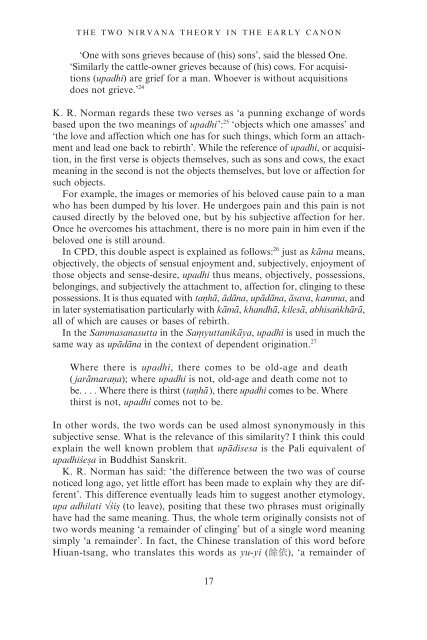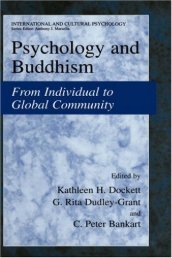Metaphor and Literalism in Buddhism: The ... - misterdanger.net
Metaphor and Literalism in Buddhism: The ... - misterdanger.net
Metaphor and Literalism in Buddhism: The ... - misterdanger.net
Create successful ePaper yourself
Turn your PDF publications into a flip-book with our unique Google optimized e-Paper software.
THE TWO NIRVANA THEORY IN THE EARLY CANON<br />
‘One with sons grieves because of (his) sons’, said the blessed One.<br />
‘Similarly the cattle-owner grieves because of (his) cows. For acquisitions<br />
(upadhi) are grief for a man. Whoever is without acquisitions<br />
does not grieve.’ 24<br />
K. R. Norman regards these two verses as ‘a punn<strong>in</strong>g exchange of words<br />
based upon the two mean<strong>in</strong>gs of upadhi’: 25 ‘objects which one amasses’ <strong>and</strong><br />
‘the love <strong>and</strong> affection which one has for such th<strong>in</strong>gs, which form an attachment<br />
<strong>and</strong> lead one back to rebirth’. While the reference of upadhi, or acquisition,<br />
<strong>in</strong> the first verse is objects themselves, such as sons <strong>and</strong> cows, the exact<br />
mean<strong>in</strong>g <strong>in</strong> the second is not the objects themselves, but love or affection for<br />
such objects.<br />
For example, the images or memories of his beloved cause pa<strong>in</strong> to a man<br />
who has been dumped by his lover. He undergoes pa<strong>in</strong> <strong>and</strong> this pa<strong>in</strong> is not<br />
caused directly by the beloved one, but by his subjective affection for her.<br />
Once he overcomes his attachment, there is no more pa<strong>in</strong> <strong>in</strong> him even if the<br />
beloved one is still around.<br />
In CPD, this double aspect is expla<strong>in</strong>ed as follows: 26 just as kAma means,<br />
objectively, the objects of sensual enjoyment <strong>and</strong>, subjectively, enjoyment of<br />
those objects <strong>and</strong> sense-desire, upadhi thus means, objectively, possessions,<br />
belong<strong>in</strong>gs, <strong>and</strong> subjectively the attachment to, affection for, cl<strong>in</strong>g<strong>in</strong>g to these<br />
possessions. It is thus equated with taOhA, AdAna, upAdAna, Asava, kamma, <strong>and</strong><br />
<strong>in</strong> later systematisation particularly with kAmA, kh<strong>and</strong>hA, kilesA, abhisaWkhArA,<br />
all of which are causes or bases of rebirth.<br />
In the Sammasanasutta <strong>in</strong> the SaNyuttanikAya, upadhi is used <strong>in</strong> much the<br />
same way as upAdAna <strong>in</strong> the context of dependent orig<strong>in</strong>ation. 27<br />
Where there is upadhi, there comes to be old-age <strong>and</strong> death<br />
( jarAmaraOa); where upadhi is not, old-age <strong>and</strong> death come not to<br />
be. . . . Where there is thirst (taOhA), there upadhi comes to be. Where<br />
thirst is not, upadhi comes not to be.<br />
In other words, the two words can be used almost synonymously <strong>in</strong> this<br />
subjective sense. What is the relevance of this similarity? I th<strong>in</strong>k this could<br />
expla<strong>in</strong> the well known problem that upAdisesa is the Pali equivalent of<br />
upadhiUeLa <strong>in</strong> Buddhist Sanskrit.<br />
K. R. Norman has said: ‘the difference between the two was of course<br />
noticed long ago, yet little effort has been made to expla<strong>in</strong> why they are different’.<br />
This difference eventually leads him to suggest another etymology,<br />
upa adhi/ati √UiL (to leave), posit<strong>in</strong>g that these two phrases must orig<strong>in</strong>ally<br />
have had the same mean<strong>in</strong>g. Thus, the whole term orig<strong>in</strong>ally consists not of<br />
two words mean<strong>in</strong>g ‘a rema<strong>in</strong>der of cl<strong>in</strong>g<strong>in</strong>g’ but of a s<strong>in</strong>gle word mean<strong>in</strong>g<br />
simply ‘a rema<strong>in</strong>der’. In fact, the Ch<strong>in</strong>ese translation of this word before<br />
Hiuan-tsang, who translates this words as yu-yi ( ), ‘a rema<strong>in</strong>der of<br />
17











